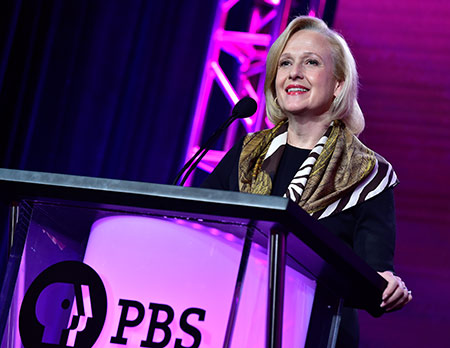TCA: PBS‘ Kerger Touts ‘Mercy Street’ Premiere Ratings, Addresses Concerns About Spectrum Auction

The smarter way to stay on top of broadcasting and cable industry. Sign up below
You are now subscribed
Your newsletter sign-up was successful
Complete Coverage: TCA Winter Press Tour
Pasadena, Calif. -- With PBS’ darling Downton Abbey airing its final season, PBS President and CEO Paula Kerger was eager to tout the performance of the public broadcaster’s latest drama Mercy Street, which premiered Sunday night.
The numbers “far exceeded” internal expectations, Kerger said, after revealing the Ridley Scott Civil War series garnered a 2.2 in fast overnight ratings, which she had just received prior to her executive session Monday at PBS' portion of the TCA winter press tour. These ratings were higher than the season three premiere of Sherlock, she noted.
As far as an early renewal for Mercy Street -- which is PBS' first original American drama in nearly a decade -- Kerger said, “We have very much left the door open for a season two,” but was not ready to make that announcement yet.
The solid debut for Mercy Street is directly related to lessons learned from the success of Downton Abbey, Kerger said, referring to its social media presence, windowing strategies and digital offerings.
“We look for series that can come back rather than one-offs,” she said about series like Downton and Mercy. “The opportunity to tell stories over a longer arc is something that is different in the way we think about [programming].”
Kerger was also asked about the upcoming FCC spectrum auction and its effect on PBS stations. She clarified that a station has to have spectrum to be part of PBS, but can “relinquish” half and still remain a broadcaster.
The smarter way to stay on top of broadcasting and cable industry. Sign up below
This so-called 50 percent rule is based on the fact that some of the rights to certain programs and projects rely on over-the-air broadcast.
“We exist to serve all of the public and all of our public can reach over the air,” Kerger clarified. “It is our requirement that if you are a PBS station you have to broadcast.”
While Kerger said they have currently entered a quiet period where no one is allowed to talk about individual stations, she did express her concern about everyone in the country having access.
She is particularly worried about those in rural areas, low income families and older residents because “those are the people who rely on public television.”
Her hope is by the time the auction is over -- likely by June -- there won’t be any holes.
After Netflix revealed its plans to spend $6 billion on content this year at its session Sunday, Kerger shed some light on how much PBS spends on its programming.
“It’s way small,” she joked. “I spend less on all of our content than HBO spends on the promotion of a big series.”
But PBS did allocate some money toward marketing for the final season of Downton Abbey – something Kerger said was a smart decision.
“We don’t have huge marketing budgets, so we cobbled together money from our own resources and marketing partners in order to send off Downton with a great, warm farewell,” she said. “Linking it to the premiere of Mercy Street [in the marketing], served us well. It was a good choice.”
Kerger had less to say about PBS' other mainstream success -- Sherlock -- starring Benedict Cumberbatch and Martin Freeman, but did say season four will return sometime about a year from now.
When asked about her feelings about PBS’ longrunning kids staple Sesame Street heading to HBO, the PBS chief said the series is only one part of the broadcaster’s children’s programming initiative.
“[We are] happy Sesame is a part but it is only a part of what is a much bigger effort,” she said “Whether it’s a good thing or a bad thing, we will see how this continues to play out.”
Other PBS announcements made Monday included:
—“PBS Election 2016” will be the broadcaster’s comprehensive schedule of news, public affairs, documentary and digital programming. Through a new partnership with NPR, the two news organizations will share content with PBS creating an elections-focused digital destination on its website.
—Multi-part documentary 16 for '16 (working title) highlights memorable presidential and vice presidential candidates with dramatic campaigns that shaped history. The series will air in 16, 30-minute episodes and will be produced by digital magazine OZY Media.
—PBS is partnering with Time Inc. on A Year in Space, a two-part series that features Scott and Mark Kelly. The first part will chronicle Scott’s 12-month journey aboard the International Space Station from training to landing and will premiere on March 2, coinciding with Scott’s scheduled return to Earth. The second part is due on the broadcaster in 2017.
—Hamilton’s America will take a behind-the-scenes look at the Broadway musical "Hamilton". The documentary is set to land on Great Performances in fall 2016.
—The public broadcaster has commissioned a six-part science series presented and narrated by Prof. Stephen Hawking. For Genius By Stephen Hawing, PBS is partnering with National Geographic, which will air the series internationally on National Geographic Channel. In the U.S., the series will air on PBS in 2016.
Jessika Walsten contributed to this report.
